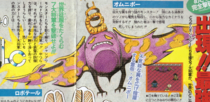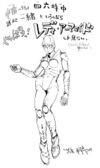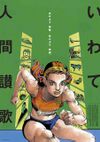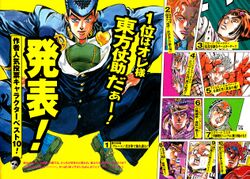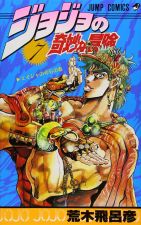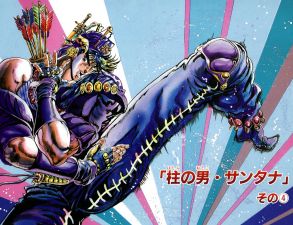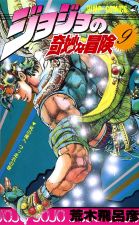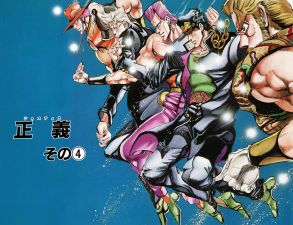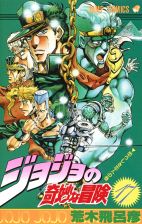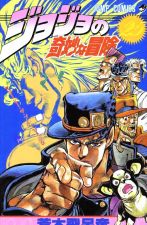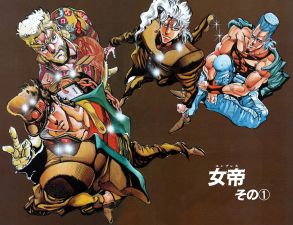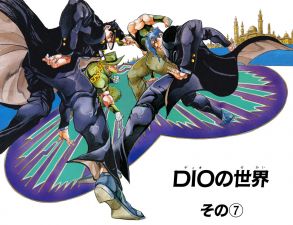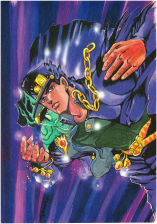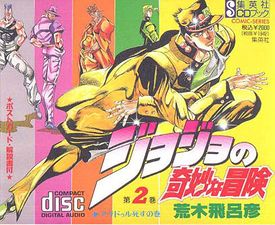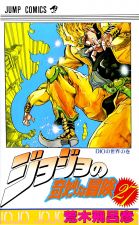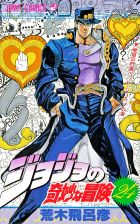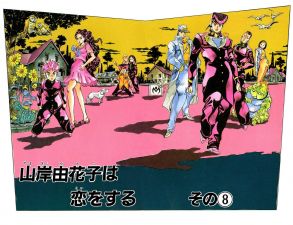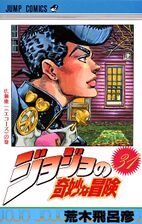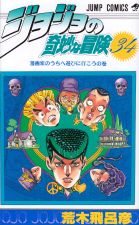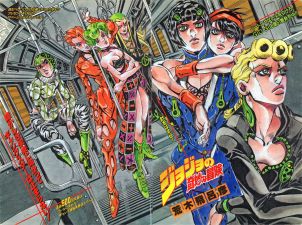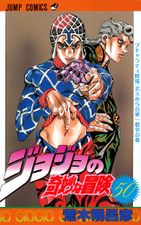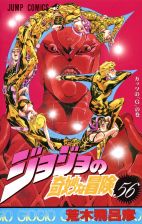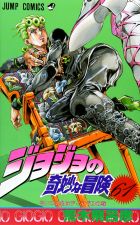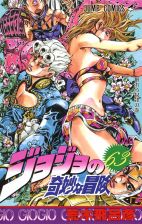Hirohiko Araki (荒木 飛呂彦, Araki Hirohiko), born Toshiyuki Araki (荒木 利之, Araki Toshiyuki), is a Japanese manga artist and the author of JoJo's Bizarre Adventure. He made his debut in 1980 with his one-shot Poker Under Arms, and began his professional career with the short series Cool Shock B.T., Baoh the Visitor, and Gorgeous Irene.
Araki's biggest series, JoJo's Bizarre Adventure, began in December 1986 and is divided into nine parts. It continues to be serialized, totaling 136 volumes as of December 2024, and circulating over 120 million copies as of January 2022.[12]
Hirohiko Araki's artwork and manga are inspired by numerous Western influences including music, paintings, sculptures, fashion, and films. He is one of the most well-known manga artists in the world and has won several awards throughout his career. In addition to his manga, Araki has written novels, appeared on television shows, delivered lectures at universities and museums, been referenced in other manga and anime, and had his work exhibited at the Louvre.
Biography
Childhood and Youth
Toshiyuki Araki was born on June 7, 1960, in Sendai, Japan, the capital city of Miyagi Prefecture. He grew up with his father who was an office worker at Japan Tobacco,[13] his stay-at-home mother, and his younger sisters, a pair of identical twins four years younger than him.[14][15] He attended Komatsushima Elementary School, where he and his friends mimicked the Boy Detectives from Edogawa Ranpo's works. Araki didn't always aspire to be a manga artist, and usually spent time playing outside or following older kids around.[16] He explored the whole city with his friends, such as nearby forests, swamps, and bomb shelters. Together, they built a secret base using wooden crates and even tried searching for buried gold they heard about in a local legend.[17]
In his youth, Araki was bullied by his sisters on a daily basis and consequently didn't look forward to coming home.[7] Although he believed his parents loved him and his sisters equally, he would feel left out seeing his sisters do everything together.[18] Araki's sisters would secretly steal his snacks which led him to believe he never had a snack to begin with.[7] He also claims they conspired together to have their parents only scold him alone after he fought with one of them. At school, his teachers would falsely suspect him whenever an incident occurred.[19] Feeling lonely and misunderstood by everyone, he spent time either by himself in his room[7] or at his grandfather's place, where he discovered manga, movies, and art.[18]
Araki credits manga for saving his life back then, reading classic series from the '60s and '70s like Tomorrow's Joe, Kamui,[7] Ring ni Kakero, Cobra, The Circuit Wolf, Boy of the Wilderness Isamu, Ajihei the Cook,[20] Osamu Tezuka's works,[15] samurai manga, and Kazuo Umezu's horror works.[21] The first manga he bought was MUYONOSUKE by Takao Saito. Mitsuteru Yokoyama's Babel II and the works of Ikki Kajiwara like Star of the Giants and Ai to Makoto significantly inspired him.[7][14] He was also particularly influenced by his grandfather, who loved making things regardless of what they were, and would make Araki things like models and kites.[18] His father was the same way, carving wood into the shape of a yacht and letting it float on water when a 5-year-old Araki asked him to buy a yacht. On the other hand, his mother was more serious, telling him to listen to musicians like Mozart rather than Led Zeppelin. However, she would still buy him old art books and manga.[13]
Aside from manga, Araki would read his father's collection of art books,[14] as well as Edogawa Ranpo's novels and the Sherlock Holmes series.[15] Moreover, he inherited his father's passion for films. In 1966, Araki wanted to watch Gamera, but his father took him to see For a Few Dollars More instead. Since then, Araki became a big fan of Sergio Leone's spaghetti Westerns and Clint Eastwood.[22] Additional major influences for him were the French artist Paul Gauguin and the American painter Jasper Johns.[14][23] Araki not only found Gauguin's work impressive, but also his way of life, citing how Gauguin lived away from society in Tahiti for his pursuit of art. Thus, Araki desired to pursue a single thing as well.[18] Around that time is when he started listening to foreign rock music such as the songs by Chicago, Yes, Led Zeppelin, Jackson Browne, and Bob Dylan. Since records were too expensive for him to buy and he didn't have a cassette recorder, he would tape songs off the radio using a huge reel-to-reel tape recorder which he told his parents he needed for English practice.[24] Magic and sleight of hand tricks also interested him, so he bought books and practiced a lot with cards, becoming quite good at it.[21]
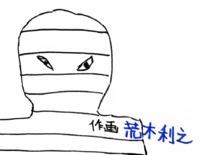
Araki believes that he first started drawing when he was in kindergarten or first grade by trying to reproduce Sanpei Shirato's Watari and Tetsuya Chiba's Harris no Kaze.[24] He attended art classes in his neighborhood[25] and started drawing more at the age of seven.[21] Araki drew his very first manga while he was eight years old in fourth grade, which was when a childhood friend complimented the composition of his art.[13][17] This friend discussed the differences between Japanese and American heroes, and the different ways that creators like Shigeru Mizuki and Kazuo Umezu depict fear, helping Araki develop his analytical skills. One day, after Araki drew a side character more impressively than the protagonist, his friend praised the manga as being interesting, prompting Araki to decide to become a manga artist.[13] However, manga did not have a good public image at the time,[25] and his parents and teachers warned him that reading manga would make him stupid.[20] Therefore, Araki had to draw behind his parents' backs using India ink to pursue his passion.[25]
Araki played little league baseball while he was in elementary school, but didn't enjoy the aspect of group sports. For example, if he made an error, then he'd be looked down on by the others.[24] He also felt annoyed when another kid would constantly be subbed in, as Araki considered himself a better player.[15] A few years later, he went to Dainohara Junior High School.[13] Declaring he never wanted to take part in a team sport again, he switched to practicing kendo, influenced by the manga Ore wa Teppei.[15][26] His experience at kendo seems to have been lukewarm, as he says nobody praised him whether he won or lost a match.[27] However, being in the kendo club saved him during one situation when he was passing by a group of four to five senior delinquents at a place he referred to as "Shakedown Road". Although they threatened Araki at first, they released him upon realizing he was in the kendo club, as they had acquaintances in the club as well.[13] Educationally, his favorite subjects were social studies and sciences, but he also performed well in mathematics.[15] On the other hand, he considered himself poor in English.[7]
Araki attended Tohoku Gakuin Tsutsujigaoka High School.[28] It was a Christian school, specifically a Protestant one, influencing his way of thinking.[27]
Professional Debut
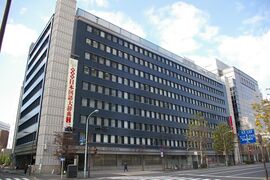
Araki began submitting work to publishers during his first year at Tohoku Gakuin Tsutsujigaoka High School.[29] However, all of his submissions were rejected.[14] Araki also applied his works to the Tezuka Awards, having at one point been nominated in the 14th edition in 1977 for a one-shot named "The Bottle" then submitted under the name Toshi Arakino (荒木之利, Arakino Toshi).[30] At the same time, other artists who were around his age continued to make big splashes with their debuts (Ex: Yudetamago, Masakazu Katsura). Araki could not understand why he was being rejected, so one day in 1979, he decided to pay a visit to an editorial department in Tokyo for direct feedback on his most recently finished work. At first, he intended to visit Shogakukan, which published Weekly Shōnen Sunday, but was intimidated by the size of their building, and decided to take his submission into the smaller Shueisha (Publishers of Weekly Shonen Jump) building next door. It was noon when he visited, but one rookie editor named Ryosuke Kabashima happened to be there. Kabashima, after reading the first page, promptly quipped "your white-out's leaked (You haven't fixed it)": he was criticized every time the editor flipped through each page. Araki, exhausted from having been up all night, felt like he was going to pass out, but was told to fix it up for the Tezuka Awards. Months later, Araki would submit a one-shot by the name of "Poker Under Arms", which won the runner up prize at the Tezuka Awards.[14][31]
Araki left Miyagi University of Education before graduating, and made his debut in 1980 with the aforementioned one-shot Poker Under Arms. He did graduate from the Sendai Design College. His first serialization in Weekly Shonen Jump was Cool Shock B.T. in 1983,[31] with his works Baoh the Visitor (1984) and Gorgeous Irene (1984) following soon after. His next series would become his magnum opus, 1986's JoJo's Bizarre Adventure.
On November 30, 2016, Araki won the 45th Annual Best Dresser Awards in Tokyo in the "Academic and Cultural Arts" division. When questioned about his youthful appearance, Araki said that he washes his face every morning with Tokyo's tap water.[32]
Araki was given an art award for the year 2018 by the Agency for Cultural Affairs for his art exhibition Ripples of Adventure.[33]
JoJo's Bizarre Adventure
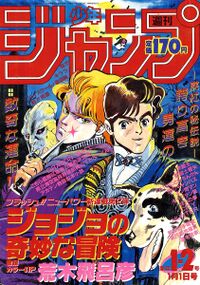
Published in Weekly Shonen Jump between 1987 and 2004 and from 2004 to the present in Ultra Jump, JoJo's Bizarre Adventure represents Hirohiko Araki's primary brand and body of work.
The JoJo's Bizarre Adventure series brought fame to Araki as its popularity skyrocketed during the publication of Stardust Crusaders and Araki kept working on the series even after the end of the third part, which was the end of what he had planned for the stories beforehand.[34]
The dust jacket of every volume of JoJo contains a note to the reader; a relatively great source of Araki's direct opinions.
In 2012, Araki celebrated his 30th year as a manga artist and the 25th anniversary of JoJo’s Bizarre Adventure. A special exhibition was held in Sendai, Japan, which included the announcement for the TV Anime and All-Star Battle.
Personal life
Araki is often commented on for his unchanging youthful demeanor over the years. He cites training at the gym and Hitomebore rice as methods for staying fit while over the age of 50,[35] as well as swimming.[36] In his 2007 Eureka Interview, he is complimented by Japanese psychologist and critic, Tamaki Saito, but states that the main reason he switched to a monthly serialization was from no longer being able to handle the weekly schedule.[37] Araki has revealed that after he was operated for gastroenteritis, Araki realized that he could no longer completely devote himself to his manga and sought to enjoy life more and practice other activities such as traveling or cooking.[38]
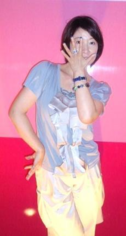
Araki is well known for his position on staying healthy. He enjoys going on walks and riding a bike, particularly to Japanese shrines, and has commended it as his coping mechanism when exhausted from work. He considers exercise as a great way to discipline one's self and that carrying too many things can be a burden; Araki will typically only carry a raincoat, water, and an iPod when going out.[39][40]
Religion-wise, although Araki attended a Protestant school, he doesn't believe in God. Nonetheless, he has faith in "something" which he can't quite define, but believes that destiny is part of it.[27]
Araki lost his ancestral house in Sendai during the Tohoku earthquake. The house was destroyed by the tsunami following the earthquake, which shocked Araki.[41]
Family
Married to Asami Araki, Araki is the father of two girls. A couple years after his debut, Araki met Asami in a group meet-up, and the two got married three months later.[42][43]
Works
- See also: Release Timeline
Manga
(Bājinia ni Yoroshiku)
(Gōjasu Airin)
Super Jump 1986 #1
December 29, 1986
(JoJo no Kimyō na Bōken)
Ongoing
(Henjin Henkutsu Retsuden)
August 19, 2003
(Shikei Shikkōchū Datsugoku Shinkōchū)
(Oingo to Boingo Kyōdai Daibōken)
Novels and Books
(JoJo no Kimyō na Bōken)
(Joōheika no Shōnen Supai! Arekkusu)
July 26, 2007
(Tyurupu-hakase no Kaibōgaku Kōgi)
(Shikei Shikkōnin Sanson)
(Haipā Anguru Pōzu-shū)
(Haipā Anguru Pōzu-shū vol.2 shape of men)
(Haipā Anguru Pōzu-shū vol.3 feminine beauty)
(Araki Hirohiko no Kimyō na Hora Eiga-ron)
(Hajishirazu no Pāpuru Heizu)
(Ikinobiru Tame no Rakan)
(Jōji Jōsutā)
(Araki Hirohiko no Chō Hen'ai! Eiga no Okite)
(Kaiki Zanmai Igirisu Kyōfu Shōsetsu no Sekai)
(Araki Hirohiko no Manga-jutsu)
(Mugen no Ō)
April 18, 2024
(Ajia Jinbutsu-shi)
April 26, 2024
(Kishibe Rohan wa Saorenai Tanpen Shōsetsu-shū)
(Kureijī Daiyamondo no Akuryō-teki Shitsuren -JoJo no Kimyō na Bōken Yori-)
(Araki Hirohiko no Shin Manga-jutsu Akuyaku no Tsukuri-kata)
(Kishibe Rohan wa Warawanai Tanpen Shōsetsu-shū)
Artbooks and Magazines
TV Appearances
Other Illustrations
Style and Influences
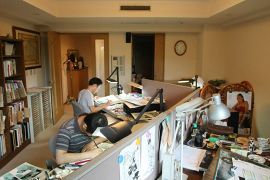
In terms of cartooning, a comparison can be drawn between Phantom Blood, Battle Tendency, and Stardust Crusaders (1987 - '92) and the hypermasculine (and highly dimorphic) anatomical ideals applied by Tetsuo Hara in Fist of the North Star, and referenced by Araki in relation to action heroes of the 1980s.[34] Diamond is Unbreakable ('92 - '96) marks a transition to a more intersexual model; while Steel Ball Run (2004 - '11) sees greater realism, along with further incorporation of ideals of beauty consistent with the mode in fashion design. When he started JoJolion (2011 – '21), Araki expressed a will to draw in a looser style and things he never drew before. Hence, he says, he bust shots and increased the amount of white panels and included more white elements in his drawings, in contrast to the darkness of his style present in previous works.[44]
Reference to illustrations by artists including Antonio Lopez and Tony Viramontes informs a number of individual illustrations and character poses in Araki's work from 1987 - 1992; decreasing from then along with increased use of photographic references.[45] Limited examples of costumes borrowed from contemporary fashion design have been identified.
As a film fan, in the 1980s Araki noted the popularity of action movies and the muscular physiques characteristic of their stars (such as Arnold Schwarzenegger and Sylvester Stallone). By this example, Araki would ponder; "Who is the strongest person in the world?". Subjects such as immortality and justice occurred to him as things that humans innately value and seek. Araki had also been on a trip to Italy two years prior to the creation of Part 1: Phantom Blood, where he identified the exaltation of overt human beauty characteristic of renaissance art. Araki was particularly struck by the aesthetic of the sculpture Apollo and Daphne by Italian sculptor Gian Lorenzo Bernini. The baroque sculpture's striking figures and realistic yet idealized bodies stuck in remarkable poses inspired Araki to heavily incorporate poses in his art and develop his own style.[46] Araki would combine these examples in the formulation of the basic plot and visual style of Phantom Blood.[34]
Araki has named Paul Gauguin and his approach to color theory as an influence.[14]
Araki has described his drawing method as "classical".[34] He has indicated admiration for Leonardo da Vinci in the text of the manga and otherwise; and in a video feature in JOJOVELLER, he is seen making visual reference to a book of Michelangelo's work[47] during the construction of a piece.
Manga that Araki has named as admirable or having had particular influence on him include Ai to Makoto by Ikki Kajiwara and Takumi Nagayasu, the most significant of his youth;[14] Ore wa Teppei by Tetsuya Chiba, which inspired him while in middle school to join the kendo club;[14] and Babel II by Mitsuteru Yokoyama, particularly influential for the concept of combat defined by special rules or laws.[34]
Araki has authored a book on the subject of Horror film and its influence on his work.
Araki has described his habit of naming characters and Stands after musicians and their works as "a simple hobby", and has indicated a strong preference for Western popular music.
On October 2011, Araki was deemed one of the 100 most influential people in Japan by the business magazine "Nikkei Business", in the category "creator".[48]
Hirohiko Araki's Lists
Interviews
| # | Interview | Type | Media | Published |
|---|---|---|---|---|
| 1 | NHK Special (May 1981) | Interview |
TV Program |
May 25, 1981 |
| 2 | Fanroad (May 1986) | Interview |
Magazine |
May 1986 |
| 3 | Kenritsu Umisora Koko Yakyu Buin Yamashita Taro-kun Vol. 5 (August 1988) | Commentary |
Manga Volume |
August 10, 1988 |
| 4 | Famicom Jump: Hero Retsuden Strategy Guide (April 1989) | Interview |
Guidebook |
April 1989 |
| 5 | Pafu (April 1989) | Interview |
Magazine |
April 1989 |
| 6 | Newtype (October 1989) | Interview |
Magazine |
October 9, 1989 |
| 7 | Shosetsu Subaru (May 1992) | Interview |
Magazine |
May 1992 |
| 8 | V Jump (February 1993) | Interview |
Magazine |
February 21, 1993 |
| 9 | Jump Novel (April 1993) | Interview |
Magazine |
April 1, 1993 |
| 10 | OVA Episode 8 (November 1993) | Interview |
Home Media |
November 19, 1993 |
| 11 | JoJo 6251 (December 1993) | Interview |
Artbook |
December 10, 1993 |
| 12 | Special Talk: Hirohiko Araki vs. Hiroyuki Kitakubo (July 1994) | Interview |
Home Media |
July 21, 1994 |
| 13 | OVA Episode 11 (August 1994) | Interview |
Home Media |
August 19, 1994 |
| 14 | Kappa Magazine (December 1996) | Interview |
Magazine |
December 1996 |
| 15 | Eureka (April 1997) | Interview |
Magazine |
April 1, 1997 |
| 16 | Bubka (August 1997) | Interview |
Magazine |
August 1997 |
| 17 | BIO HAZARD (January 1998) | Commentary |
Book |
January 29, 1998 |
| 18 | Feelin' JOJO (February 1998) | Interview |
Magazine |
February 9, 1998 |
| 19 | Comnavi Vol. 3 (February 1998) | Commentary |
Magazine |
February 10, 1998 |
| 20 | Great Jump (July 1998) | Commentary |
Magazine |
July 7, 1998 |
| 21 | Capcom (November 1998) | Interview |
Website/Online |
November 1998 |
| 22 | Monsoon Vol. 2 (March 1999) | Interview |
Magazine |
March 29, 1999 |
| 23 | Da Vinci (April 1999) | Interview |
Magazine |
April 6, 1999 |
| 24 | e-Jump (January 2000) | Commentary |
Magazine |
January 18, 2000 |
| 25 | JOJO A-GO!GO! (February 2000) | Interview |
Artbook |
February 25, 2000 |
| 26 | ROCKIN'ON JAPAN (March 2000) | Commentary |
Magazine |
March 2000 |
| 27 | BUZZ (July 2000) | Interview |
Magazine |
July 2000 |
| 28 | THRILL (September 2001) | Interview |
Magazine |
September 2001 |
| 29 | Comickers (November 2001) | Interview |
Magazine |
November 2001 |
| 30 | Manga OMO! (January 2002) | Commentary |
Magazine |
January 25, 2002 |
| 31 | Phantom Blood Paperback (February 2002) | Commentary |
Manga Volume |
February 15, 2002 |
| 32 | Jump Remix P3 Vol.11 (March 2002) | Interview |
Magazine |
March 25, 2002 |
| 33 | Battle Tendency Paperback Vol. 4 (May 2002) | Commentary |
Manga Volume |
May 17, 2002 |
| 34 | MEN'S NON-NO (July 2002) | Commentary |
Magazine |
July 9, 2002 |
| 35 | GioGio's Bizarre Adventure Strategy Guide (September 2002) | Interview |
Guidebook |
September 4, 2002 |
| 36 | Stardust Crusaders Paperback Vol. 10 (October 2002) | Commentary |
Manga Volume |
October 18, 2002 |
| 37 | Yomu Jump (December 2002) | Interview |
Magazine |
December 3, 2002 |
| 38 | Manga OMO! (January 2003) | Commentary |
Magazine |
January 3, 2003 |
| 39 | Weekly Shonen Brackets 100Q (April 2003) | Interview |
TV Program |
April 15, 2003 |
| 40 | JOJO in Paris (May 2003) | Interview |
Magazine |
May 7, 2003 |
| 41 | AnimeLand (June 2003) | Interview |
Website/Online |
June 1, 2003 |
| 42 | Les dossiers du Manga Vol. 7 (June 2003) | Commentary |
June 2003 | |
| 43 | COSMOPOLITAN (July 2003) | Interview |
Magazine |
July 2003 |
| 44 | Jump Remix Part 4 (January 2004) | Commentary |
Manga Volume |
January 10, 2004 |
| 45 | Bleu Vague (January 2004) | Commentary |
Magazine |
January 13, 2004 |
| 46 | Kahoku Shimpo (February 2004) | Commentary |
Newspaper |
February 10, 2004 |
| 47 | Diamond is Unbreakable Paperback | Commentary |
Manga Volume |
February 18, 2004 |
| 48 | Aomaru Jump (February 2004) | Interview |
Magazine |
February 26, 2004 |
| 49 | Playboy (July 2004) | Interview |
Magazine |
July 27, 2004 |
| 50 | MTV SOUL'd OUT Special (February 2005) | Interview |
TV Program |
February 3, 2005 |
| 51 | Vento Aureo Paperback | Commentary |
Manga Volume |
March 18, 2005 |
| 52 | Quarterly S (June 2005) | Interview |
Magazine |
June 15, 2005 |
| 53 | Da Vinci (August 2005) | Interview |
Magazine |
August 6, 2005 |
| 54 | Osaka University of Arts University Manga Vol.4 (November 2005) | Interview & Commentary |
Book |
November 25, 2005 |
| 55 | Nisio Isin Chronicle (January 2006) | Interview |
Book |
January 30, 2006 |
| 56 | SWITCH (April 2006) | Interview |
Magazine |
April 20, 2006 |
| 57 | Shonen Jump (May 2006) | Interview |
Magazine |
May 2006 |
| 58 | FINEBOYS (May 2006) | Interview |
Magazine |
May 10, 2006 |
| 59 | Tokai Lecture (June 2006) | Commentary |
Event |
June 24, 2006 |
| 60 | Phantom Blood PS2 (October 2006) | Interview |
October 26, 2006 | |
| 61 | xxxHolic Guidebook (November 2006) | Interview |
Guidebook |
November 17, 2006 |
| 62 | Weekly Young Jump (December 2006) | Interview |
Magazine |
December 14, 2006 |
| 63 | TOMORROW (January 2007) | Commentary |
January 17, 2007 | |
| 64 | Otona Anime Vol.3 (February 2007) | Interview |
Magazine |
February 2007 |
| 65 | Phantom Blood Movie Guide (February 2007) | Commentary |
TV Program |
February 9, 2007 |
| 66 | Araki x Akiya Takahashi (February 2007) | Interview |
Website/Online |
February 12, 2007 |
| 67 | Weekly SPA! (February 2007) | Interview |
Magazine |
February 13, 2007 |
| 68 | Famitsu (February 2007) | Interview |
Magazine |
February 16, 2007 |
| 69 | Playboy (February 2007) | Interview |
Magazine |
February 19, 2007 |
| 70 | Golden Wind Vol.1 - Tonkam (April 2007) | Interview |
Manga Volume |
April 27, 2007 |
| 71 | Nolife (May 2007) | Interview |
TV Program |
May 11, 2007 |
| 72 | Manga Heaven (June 2007) | Interview |
Website/Online |
June 25, 2007 |
| 73 | Araki's Paranormal Sightings (August 2007) | Commentary |
Website/Online |
August 2007 |
| 74 | Tameike Now (August 2007) | Interview |
Video |
August 7, 2007 |
| 75 | Weekly Bunshun (October 2007) | Interview |
Magazine |
October 18, 2007 |
| 76 | Tohoku University (November 2007) | Interview |
Event |
November 2, 2007 |
| 77 | Eureka (November 2007) | Interview |
Magazine |
November 26, 2007 |
| 78 | Araki x Otsuichi - The Book (December 2007) | Interview |
Magazine |
December 4, 2007 |
| 79 | Jump Square (December 2007) | Interview |
Magazine |
December 4, 2007 |
| 80 | Quick Japan (December 2007) | Interview |
Magazine |
December 10, 2007 |
| 81 | Manga Meister (December 2007) | Interview |
Website/Online |
December 20, 2007 |
| 82 | The Golden Compass (February 2008) | Interview |
Magazine |
February 20, 2008 |
| 83 | KING (March 2008) | Interview |
Magazine |
March 13, 2008 |
| 84 | Stone Ocean Paperback | Commentary |
Manga Volume |
April 18, 2008 |
| 85 | KochiKame Vol. 160 (June 2008) | Commentary |
Manga Volume |
June 4, 2008 |
| 86 | SUPER MASTERS BOOK in BOOK Vol.1 - Super Jump (October 2008) | Interview |
Magazine |
October 8, 2008 |
| 87 | NEWTRAL (April 2009) | Interview |
Newspaper |
April 1, 2009 |
| 88 | Mgirl (April 2009) | Interview |
Magazine |
April 25, 2009 |
| 89 | Weekly Bunshun (June 2009) | Interview |
Magazine |
June 11, 2009 |
| 90 | Fantasy Comic Grand Prize (July 2009) | Interview |
Website/Online |
July 9, 2009 |
| 91 | How To Train Your Manga Brain (March 2010) | Interview |
Book |
March 19, 2010 |
| 92 | Futoko Shimbun (January 2011) | Interview |
Newspaper |
January 1, 2011 |
| 93 | Hirosegawa (February 2011) | Interview |
Website/Online |
February 14, 2011 |
| 94 | Rohan au Louvre (May 2011) | Interview |
Manga Volume |
May 31, 2011 |
| 95 | Shueisha Shinsho (July 2011) | Commentary |
Video |
July 2011 |
| 96 | Weekly Bunshun (July 2011) | Interview |
Magazine |
July 28, 2011 |
| 97 | Hirohiko Araki x Hiromu Arakawa (July 2011) | Interview |
Artbook |
July 29, 2011 |
| 98 | JoJo's Bizarre Adventure × Amazon.co.jp (August 2011) | Interview |
Website/Online |
August 5, 2011 |
| 99 | Houyhnhnm (September 2011) | Interview |
Website/Online |
September 27, 2011 |
| 100 | Kanto Federation of Bar Associations (November 2011) | Interview |
Website/Online |
November 5, 2011 |
| 101 | SPUR Magazine (November 2011) | Interview |
Magazine |
November 22, 2011 |
| 102 | Asahi Shimbun (December 2011) | Commentary |
Newspaper |
December 16, 2011 |
| 103 | TSUTAYA Cinema Handbook (December 2011) | Commentary |
Guidebook |
December 23, 2011 |
| 104 | Shinkenzemi (February 2012) | Interview |
Magazine |
February 2012 |
| 105 | Shueisha Shinsho (April 2012) | Commentary |
Video |
April 27, 2012 |
| 106 | JoJo Exhibition Press Conference (July 2012) | Interview & Commentary |
Event |
July 5, 2012 |
| 107 | Lawson Ticket (July 2012) | Interview |
Magazine |
July 5, 2012 |
| 108 | Tokyo Shimbun (July 2012) | Interview |
Newspaper |
July 6, 2012 |
| 109 | MEN'S NON-NO (July 2012) | Interview |
Magazine |
July 28, 2012 |
| 110 | Da Vinci (September 2012) | Commentary |
Magazine |
September 6, 2012 |
| 111 | HIROHIKO ARAKI GOES TO NEW YORK. (October 2012) | Commentary |
Mook |
October 5, 2012 |
| 112 | HIROHIKO ARAKI MEETS Clint Eastwood (October 2012) | Interview |
Mook |
October 5, 2012 |
| 113 | JoJo Could Have Ended with Part 4 (October 2012) | Interview |
Mook |
October 5, 2012 |
| 114 | The Story of Brushes and Pens (October 2012) | Interview |
Mook |
October 5, 2012 |
| 115 | Toh EnJoe x Hirohiko Araki (October 2012) | Interview |
Mook |
October 5, 2012 |
| 116 | Yomiuri Shimbun (October 2012) | Commentary |
Newspaper |
October 12, 2012 |
| 117 | Xtrend Nikkei (October 2012) | Interview |
Magazine |
October 19, 2012 |
| 118 | Dream Talk Session (August 2013) | Interview |
Video |
August 28, 2013 |
| 119 | All-Star Battle Strategy Guide (August 2013) | Interview & Commentary |
Guidebook |
August 29, 2013 |
| 120 | Bungei Shunju (September 2013) | Commentary |
Magazine |
September 10, 2013 |
| 121 | Asahi Shimbun (September 2013) | Interview |
Newspaper |
September 14, 2013 |
| 122 | Hirohiko Araki x Ryosuke Kabashima (September 2013) | Interview |
Artbook |
September 19, 2013 |
| 123 | JOJOVELLER (September 2013) | Interview & Commentary |
Artbook |
September 19, 2013 |
| 124 | JOJOVELLER DECODE JOJO's Artwork | Commentary |
Artbook |
September 19, 2013 |
| 125 | JOJOVELLER Stand Guide Commentaries | Commentary |
Artbook |
September 19, 2013 |
| 126 | JOJO JOURNEY (September 2013) | Commentary |
Artbook |
September 19, 2013 |
| 127 | Tohoku University (October 2013) | Commentary |
Event |
October 12, 2013 |
| 128 | JoJonium Vol. 1-3 (December 2013) | Commentary |
Manga Volume |
December 4, 2013 |
| 129 | Kotoba (December 2013) | Interview |
Magazine |
December 6, 2013 |
| 130 | 3D Latte Art!! (January 2014) | Interview & Commentary |
Artbook |
January 24, 2014 |
| 131 | Japan Media Art Festival (February 2014) | Interview |
Video |
February 4, 2014 |
| 132 | JoJonium Vol. 4-7 (February 2014) | Commentary |
Manga Volume |
February 4, 2014 |
| 133 | JoJonium Vol. 8-17 (June 2014) | Commentary |
Manga Volume |
June 4, 2014 |
| 134 | Atsushi Watanabe's Building Exploration (October 2014) | Commentary |
Mook |
October 31, 2014 |
| 135 | Shueisha Shinsho (April 2015) | Commentary |
Video |
April 20, 2015 |
| 136 | Okazu no Cooking (September 2015) | Commentary |
Magazine |
September 19, 2015 |
| 137 | Kotoba (March 2016) | Interview |
Magazine |
March 5, 2016 |
| 138 | Rurubu Moriohcho (March 2016) | Interview |
Guidebook |
March 18, 2016 |
| 139 | Da Vinci (April 2016) | Interview & Commentary |
Magazine |
April 6, 2016 |
| 140 | Miracle Jump (April 2016) | Interview |
Magazine |
April 19, 2016 |
| 141 | Anime Expo (July 2016) | Commentary |
Video |
July 1, 2016 |
| 142 | Hitchcock-Truffaut (December 2016) | Commentary |
Pamphlet |
December 10, 2016 |
| 143 | Steel Ball Run Paperback | Commentary |
Manga Volume |
February 17, 2017 |
| 144 | King's Brunch (March 2017) | Interview |
TV Program |
March 11, 2017 |
| 145 | MTV BACK TO 80's (March 2017) | Commentary |
TV Program |
March 18, 2017 |
| 146 | Anime News Network (June 2017) | Interview |
Website/Online |
June 29, 2017 |
| 147 | Anime Expo (July 2017) | Interview & Commentary |
Video |
July 2, 2017 |
| 148 | Shonen Jump (July 2017) | Interview |
Magazine |
July 17, 2017 |
| 149 | Araki x Tetsuo Hara (September 2017) | Interview |
Event |
September 24, 2017 |
| 150 | Kotoba (March 2018) | Interview |
Magazine |
March 6, 2018 |
| 151 | Araki x Kinoshita (July 2018) | Interview |
Website/Online |
July 5, 2018 |
| 152 | Araki's Motivation (August 2018) | Interview |
Website/Online |
August 17, 2018 |
| 153 | SPUR Magazine (August 2018) | Interview |
Magazine |
August 23, 2018 |
| 154 | Hirohiko Araki JoJo Exhibition: Ripples of Adventure (August 2018) | Interview |
Artbook |
August 24, 2018 |
| 155 | UOMO Magazine (August 2018) | Interview |
Magazine |
August 24, 2018 |
| 156 | CNET Japan (November 2018) | Interview |
Website/Online |
November 24, 2018 |
| 157 | New York Times Japan (November 2018) | Interview |
Website/Online |
November 25, 2018 |
| 158 | Kotoba (December 2018) | Interview |
Magazine |
December 6, 2018 |
| 159 | Kotoba (June 2019) | Commentary |
Magazine |
June 6, 2019 |
| 160 | Lucca Comics (October 2019) | Interview |
Event |
October 30, 2019 |
| 161 | JOJOnicle (December 2019) | Interview |
Artbook |
December 19, 2019 |
| 162 | VIZ Media (January 2020) | Interview |
Video |
January 27, 2020 |
| 163 | Nagasaki Newspaper (February 2020) | Interview |
Newspaper |
February 6, 2020 |
| 164 | Kotoba (March 2020) | Commentary |
Magazine |
March 6, 2020 |
| 165 | Billboard Japan (August 2021) | Interview |
Website/Online |
August 25, 2021 |
| 166 | VOGUE+ (February 2022) | Interview |
Magazine |
February 9, 2022 |
| 167 | Hirohiko Araki x Ryosuke Kabashima (March 2022) | Interview |
Magazine |
March 19, 2022 |
| 168 | Yomiuri Shimbun (May 2022) | Interview |
Website/Online |
May 5, 2022 |
| 169 | Mainichi Shimbun (May 2022) | Interview |
Website/Online |
May 23, 2022 |
| 170 | Popcult Japan (June 2022) | Interview |
Video |
June 2, 2022 |
| 171 | Anime Expo (July 2022) | Commentary |
Video |
July 3, 2022 |
| 172 | Globe-Trotter Travel Guidebook (July 2022) | Interview |
Guidebook |
July 14, 2022 |
| 173 | Kono Mystery ga Sugoi! (December 2022) | Interview |
Magazine |
December 4, 2022 |
| 174 | Hirohiko Araki x Ryosuke Kabashima (December 2022) | Interview |
Magazine |
December 19, 2022 |
| 175 | Ripples of Adventure - Hirohiko Araki x Ryosuke Kabashima (December 2022) | Commentary |
Magazine |
December 19, 2022 |
| 176 | Hirohiko Araki's Research Techniques (December 2023) | Commentary |
Magazine |
December 19, 2023 |
| 177 | Hirohiko Araki x Ryosuke Kabashima (December 2023) | Interview |
Magazine |
December 19, 2023 |
| 178 | Phantom Blood Musical Commentaries (February 2024) | Commentary |
Pamphlet |
February 12, 2024 |
| 179 | Osaka Station West District Art Project (May 2024) | Interview |
Video |
May 16, 2024 |
| 180 | THE FOUNTAIN BOY Unveiling Ceremony (July 2024) | Interview |
Video |
July 29, 2024 |
| 181 | Exploring Yebisu Through Bijin-ga (February 2025) | Interview |
Video |
February 13, 2025 |
References
- ↑ https://web.archive.org/web/20170905232212/http://jihou.tohoku-gakuin.jp/archive/519/jiho_519_02.pdf
- ↑ Jump up to: 2.0 2.1 2.2 2.3 JoJo 6251, P. 170
- ↑ 知事メッセージ 荒木飛呂彦氏によるイラスト
- ↑ Mainichi Shimbun (May 2022)
- ↑ Steel Ball Run Chapter 15: The Desert Born Outlaws, Part 1 - Author's note
- ↑ Newtype (October 1989)
- ↑ Jump up to: 7.00 7.01 7.02 7.03 7.04 7.05 7.06 7.07 7.08 7.09 7.10 7.11 7.12 Weekly Shonen Brackets 100Q (April 2003)
- ↑ Interview with Shoko Nakagawa, 2007
- ↑ Comnavi Vol. 3 (February 1998)
- ↑ Weekly Shonen Jump 1983 Issue #44
- ↑ Anime Expo (July 2017)
- ↑ My Rohan Kishibe Talk - "JoJo's Bizarre Adventure Has Printed 120,000,000 Copies". JoJo-News. December 18, 2021.
- ↑ Jump up to: 13.0 13.1 13.2 13.3 13.4 13.5 Tohoku University (October 2013)
- ↑ Jump up to: 14.0 14.1 14.2 14.3 14.4 14.5 14.6 14.7 14.8 Tokai Lecture (June 2006)
- ↑ Jump up to: 15.0 15.1 15.2 15.3 15.4 15.5 MEN'S NON-NO (July 2002)
- ↑ Fanroad (May 1986)
- ↑ Jump up to: 17.0 17.1 Kahoku Shimpo (February 2004)
- ↑ Jump up to: 18.0 18.1 18.2 18.3 Da Vinci (August 2005)
- ↑ Stardust Crusaders Paperback Vol. 10 (October 2002)
- ↑ Jump up to: 20.0 20.1 Manga Meister (December 2007)
- ↑ Jump up to: 21.0 21.1 21.2 Kappa Magazine (December 1996)
- ↑ HIROHIKO ARAKI MEETS Clint Eastwood (October 2012)
- ↑ Playboy (July 2004)
- ↑ Jump up to: 24.0 24.1 24.2 JoJo 6251 (December 1993)
- ↑ Jump up to: 25.0 25.1 25.2 Kanto Federation of Bar Associations (November 2011)
- ↑ BUZZ (July 2000)
- ↑ Jump up to: 27.0 27.1 27.2 THRILL (September 2001)
- ↑ Hirosegawa (February 2011)
- ↑ https://ameblo.jp/killer-jojo/entry-12237632205.html Araki attended Tohoku Gakuin Tsutsujigaoka High School
- ↑ atmarkjojo.org/archives/15678.html
- ↑ Jump up to: 31.0 31.1 Jason Thompson's House of 1000 Manga - JoJo's Bizarre Adventure
- ↑ https://web.archive.org/web/20161130161340/http://www.hochi.co.jp/entertainment/20161130-OHT1T50178.html
- ↑ Asahi - 芸術選奨に30人 竹内まりやさん、荒木飛呂彦さんら
- ↑ Jump up to: 34.0 34.1 34.2 34.3 34.4 Phantom Blood PS2 interview, 2006
- ↑ Morioh Shimpo "JoJo Exhibition in Morioh, S City" Special Edition (2012) P.11
- ↑ [citation needed]
- ↑ Eureka (November 2007) P.9
- ↑ NYT Japan interview, 11/2018
- ↑ Eureka (November 2007) P.19
- ↑ NEWTRAL (April 2009), Part 4: Relaxing, Araki style
- ↑ Kahoku Shimpo, October 10, 2014.@TadTwi2011 (October 20, 2014), "今朝の河北新報、荒木飛呂彦さん。「震災では沿岸部にあった14代続く荒木家の本家が流された。思い出の風景がなくなりショックを受けたが、自分のするべき事は漫画を描き続け、その雑誌を日本中に届ける事が一番大切ではないかと思った。」", on Twitter.
- ↑ 荒木先生との馴れ初めからジョジョ立ちまで! 講演『荒木麻美のジョジョと奇妙な生活』レポート
- ↑ Interview: JoJo and Asami Araki's Bizarre Life (November 2009)
- ↑ Interview:JOJOmenon (October 2012)
- ↑ http://www30.atwiki.jp/ichi-1/pages/12.html
- ↑ Hirohiko Araki's Manga Techniques, Chapter 5; I found my style in Italy
- ↑ Michelangelo – Tuttle le Opere – Edizione Riserveta ai Musei e Gallerie Pontificie, ISBN 9788872040256
- ↑ https://business.nikkei.com/atcl/opinion/16/101900024/102000032/
- ↑ Volume 29 (Diamond is Unbreakable Vol. 1) Author's Note
- ↑ Hirohiko Araki's Top 10 Movies That Had Him Squirming in His Seat (The ten best movies I wished would stop but I kept watching anyway.) (From the Diamond is Unbreakable in Volume 32)
- ↑ Araki's Top 10 "Albums that make me cry" from Volume 42's Author's Note
- ↑ Araki's 5 Favorite Stands from Weekly Shonen Jump #13, 1997 - Chapter 496: The Grateful Dead, Part 9
- ↑ Araki's top 5 favorite toys from Volume 60's Author's Note
- ↑ "Araki's Favorite: Best Stands" from JOJO A-GO!GO! (2000) - STANDS, p. 34–36
- ↑ Hirohiko Araki's Best 10 Characters - Author's Popularity Contest (作者人気投票キャラクターベスト10) from JOJO A-GO!GO! (2000) - Araki Hirohiko, p. 75
- ↑ "Hirohiko Araki's Favorite Illustrations Best 20" from JOJO A-GO!GO! (2000) - Araki Hirohiko, p. 52–57
- ↑ Araki's Top 10 manga he "ran to the bookstore for" (本屋に走ったマンガベスト10) from JOJO A-GO!GO! (2000) - Araki Hirohiko, p. 74
- ↑ Araki's Most Watched Films - Best 10 (くり返し観た映画ベスト10!) from JOJO A-GO!GO! (2000) - Araki Hirohiko, p. 72
- ↑ Araki's "Top 10 Obscure Movies I Like" (あまり知られてないけど自分はいいと思う映画ベストテン) from JOJO A-GO!GO! (2000) - Araki Hirohiko, p. 72
- ↑ The Best 10 Painful Songs (せつない曲ベスト10) from JOJO A-GO!GO! (2000) - Araki Hirohiko, p. 73
- ↑ Araki's Top 10 Heroes (ヒーロー) from JOJO A-GO!GO! (2000) - Araki Hirohiko
- ↑ The "Best 20 Horror Movies chosen by Hirohiko Araki" (From Hirohiko Araki's Bizarre Horror Movie Analysis)
- ↑ Jump up to: 63.0 63.1 JoJo's Bizarre Adventure × Amazon.co.jp (August 2011)
- ↑ Hirohiko Araki selects 10 "refreshing and soothing" horror movies (荒木飛呂彦が選ぶ”スカッと癒される”ホラー映画10本) from TSUTAYA Cinema Handbook 2012
- ↑ Hirohiko Araki's All-time Best 10 Clint Eastwood Films (荒木飛呂彦が選ぶイーストウッド作品オールタイムベスト 10) from JOJOmenon. They are not in any specific order.
- ↑ ARAKI'S BEST 20 SUSPENSE FILMS from Hirohiko Araki's Super-Favorites! Rules of Movies (2013)
- ↑ Jump up to: 67.0 67.1 67.2 "Hirohiko Araki's Favorites" (荒木飛呂彦のお気に入り) iTunes Store Section
- ↑ Shueisha Shinsho 15th Anniversary Fair: Five Experts Invite You
- ↑ MTV BACK TO 80's (March 2017)



